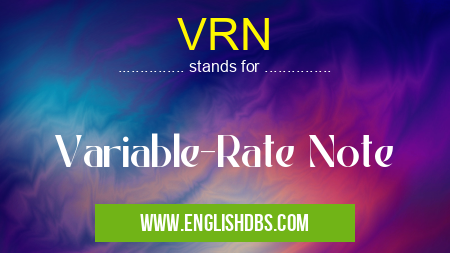What does VRN mean in STOCK EXCHANGE
VRN stands for Variable-Rate Note, a type of debt security. Companies often issue VRNs to raise funds and take advantage of lower interest rates. VRNs are sometimes referred to as adjustable rate notes (ARN), since the interest rate fluctuates over time according to market conditions. The interest rate on a VRN is tied to an index that changes regularly, usually in response to economic indicators such as inflation or employment levels. Investors enjoy the potential for higher returns with lower risk when investing in VRNs compared to other types of debt securities.

VRN meaning in Stock Exchange in Business
VRN mostly used in an acronym Stock Exchange in Category Business that means Variable-Rate Note
Shorthand: VRN,
Full Form: Variable-Rate Note
For more information of "Variable-Rate Note", see the section below.
Advantages of Investing in VRNs
The main advantage of investing in a VRN is the potential for higher returns than traditional fixed-rate bonds due to the changing nature of the underlying index. If market conditions change favorably, investors can earn more on their investments with minimal additional risk. Additionally, if inflation rises, investors may not see much benefit from holding fixed-rate bonds but they could make larger profits through owning a VRN since its value increases at a faster pace than fixed-rate bonds do under these circumstances.
Disadvantage of Investing in VRNs
One potential disadvantage of investing in a VRN is that there’s typically less liquidity than traditional fixed-rate bonds since prices can swing very quickly depending on changes to the underlying index. This means it may be hard for investors to get out at any given moment without taking losses on their original investment. Additionally, since interest payments are directly linked might potentially suffer if inflation unexpectedly spikes or dips sharply even though they would also benefit from positive swings in inflationary pressures.
Essential Questions and Answers on Variable-Rate Note in "BUSINESS»STOCKEXCHANGE"
What is a Variable-Rate Note?
A Variable-Rate Note (VRN) is a type of security where the interest rate changes depending on fluctuating market conditions. This means that the interest rate can go up or down over time, which affects the principal amount and how much needs to be paid back at once. VRNs provide investors with some protection from market volatility while allowing them to participate in potential gains.
What are the advantages of investing in a Variable-Rate Note?
Investing in a VRN can bring many advantages. One advantage is that they offer greater returns than fixed-rate investments, as their fluctuating rates can increase when market conditions improve. Additionally, since the rate can go either way, it offers some protection against losses due to market volatility. Lastly, it provides access to a more diverse range of investments beyond traditional fixed-rate options.
What types of securities are typically used as collateral for Variable-Rate Notes?
Generally speaking, most VRNs are secured by government bonds and assets that have been rated investment grade or higher. This helps ensure that investors receive secure income streams while holding these notes. Other securities such as certificates of deposits and equity shares may also be acceptable depending on the terms specified by a financial institution offering the note.
Is there any risk involved in investing in a Variable-Rate Note?
Yes, there is always risk involved when investing in any financial instrument, including VRNs. The interest rate could go up or down depending on market conditions, meaning your principal amount may change along with it. Additionally, if you hold the note for an extended period of time, inflationary pressures may mean that you don't get your desired return on investment over time. Therefore it's important to understand all related risks before investing in one of these notes.
Are Variable-Rate Notes regulated by any governmental authority?
Yes, most VRNs issued by banks and other financial institutions are subject to regulations imposed by various governmental authorities such as the Securities and Exchange Commission (SEC). These regulations help ensure investor protection and accountability when dealing with this type of security.
How do I know which Variable-Rate Note is right for me?
Choosing the best VRN for you will depend on your specific financial needs and goals as an investor. It's important to do research before deciding which note works best for you so you understand what kind of return you're aiming for and whether or not it aligns with your risk tolerance level and overall investment appetite. Consulting with a professional financial advisor can also help guide your decision making process here too if needed.
How long does it take to get money from my invested Variable-Rate Note?
Depending on the terms set out in your agreement with the issuing bank or financial institution, payments typically become available upon maturity date stated within your contract or earlier termination date if applicable.. However there may be additional restrictions such as early withdrawal penalties associated with accessing funds before maturity date so please refer carefully to all documentation prior to doing so.
Final Words:
Variable Rate Notes (VRNs) provide investors with an attractive opportunity for higher returns during times when interest rates are low or falling while still allowing them access into more secure investments than stocks and other equities products might offer. It’s important however that potential investors understand both advantages and disadvantages before committing any capital into purchasing a VRN so that they have realistic expectations about what their return will likely be given current economic conditions and future projections.
VRN also stands for: |
|
| All stands for VRN |
